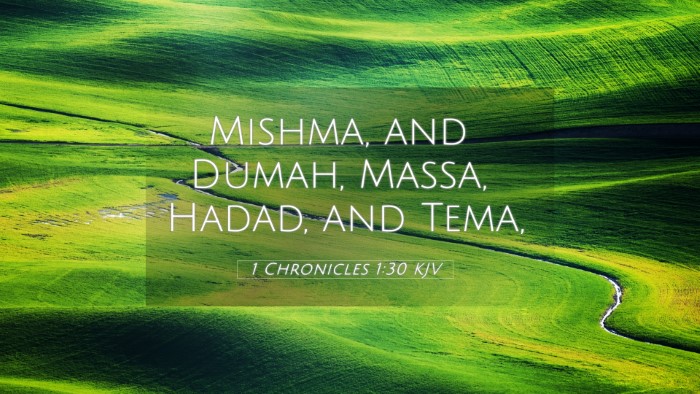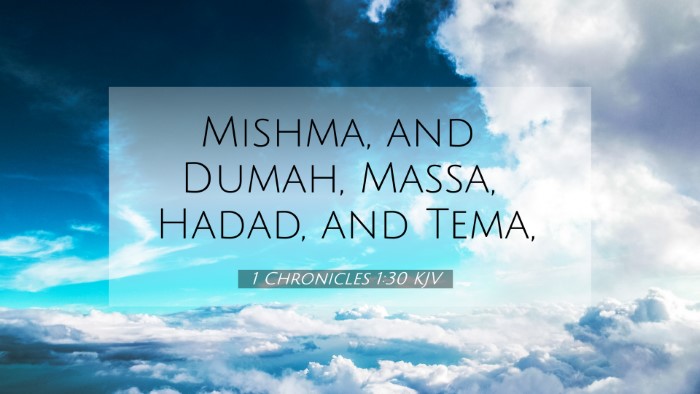Understanding 1 Chronicles 1:30
Verse: 1 Chronicles 1:30 - “The sons of Midian: Ephah, Epher, Hanoch, Abidah, and Eldah. All these were the children of Keturah.”
Verse Overview
This verse is a part of the genealogical records found in 1 Chronicles, emphasizing the lineage and descendants of Abraham through Keturah, his second wife after Sarah. It highlights important figures in Biblical history, connecting the story of Abraham with future nations and peoples.
Commentary Insights
-
Matthew Henry:
Henry notes that this list underscores God's promise to Abraham of numerous descendants. The offspring of Keturah signify God's grace extending beyond the chosen line of Isaac, hinting at diverse nations descending from Abraham while also illustrating God's covenant faithfulness.
-
Albert Barnes:
Barnes points out that the names listed may not have significant individual roles in scripture but represent nations that played their part in biblical history. They symbolize the sprawling nature of Abraham's legacy and the multiplicity of God's blessings upon his family.
-
Adam Clarke:
Clarke emphasizes the historical context, noting the importance of these relationships in understanding Israel's neighboring peoples. He links the Midianites, descendants of Keturah, with further biblical narratives, including their interactions with the Israelites throughout the Old Testament.
Cross-References
1 Chronicles 1:30 connects with various other scripture references, enhancing our understanding of biblical genealogies and their significance:
- Genesis 25:1-4: Details the same descendants of Keturah, providing a foundation for their identification.
- Exodus 2:15: Mentions Moses' flight to Midian, highlighting the role Midianite descendants played in Israel’s history.
- Numbers 31:1-9: Discusses the Israelite encounters with the Midianites, showcasing their geopolitical implications.
- Judges 6:1-6: Introduces the Midianites as oppressors of Israel during the time of Gideon, highlighting their impact on Israelite society.
- 1 Kings 10:1: Refers to the Queen of Sheba (potentially linked to Keturah's lineage), illustrating the far-reaching effects of Abraham's family.
- Matthew 1:3: Offers the genealogy of Jesus, extending the connections of Abraham through various lineages, affirming the importance of heritage.
- Hebrews 7:14: References Jesus’ lineage pointing back to Judah, establishing continuity and the fulfillment of God's promises through Abraham's family.
Thematic Connections
The study of 1 Chronicles 1:30 provides a glimpse into several significant biblical themes:
- Covenant and Promise: The verse reaffirms God's promise to Abraham to bless him with many descendants and nations.
- God's Sovereignty: It highlights God's overarching control over history as He establishes nations through Abraham’s line.
- Inclusivity of God's People: Keturah's children represent a broader scope of God's blessings beyond the direct line of Isaac, indicating His desire for inclusiveness.
- Biblical Lineage: Understanding genealogies is essential to grasping the narrative of the Bible and the unfolding plan of salvation.
- Historical Impact: The descendants of Keturah played various roles throughout biblical history, influencing God's chosen people.
Tools for Further Exploration
If you're interested in further studying the connections in the Bible, consider utilizing tools such as:
- Bible Concordance: Helps find specific words and phrases beyond the verse, aiding in deeper insights.
- Cross-Reference Bible Study: A systematic approach to linking verses that inform one another and enhance understanding.
- Bible Reference Resources: These include study Bibles, commentaries, and online tools for cross-referencing.
- Comprehensive Bible Cross-Reference Materials: For in-depth studies, resource materials that index cross-references can be invaluable.
Conclusion
1 Chronicles 1:30 serves not merely as a record of names but as a testament to God's promises and the unfolding story of redemption. By engaging with cross-references and genealogical studies, one can appreciate the interwoven narrative of Scripture that ultimately leads to Christ. Understanding this verse in the context of its background and subsequent developments in Scripture highlights the thematic ties and journeys stemming from Abraham, thus enriching one's spiritual journey.




